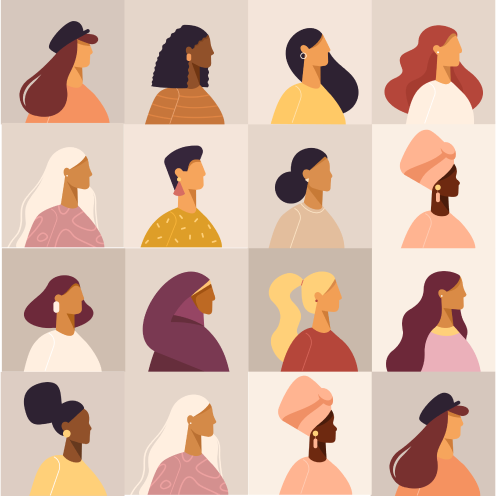When Sarah’s* ex-boyfriend kicked down her front door and grabbed her by the neck, she was laid off from her job the very next week.
She had climbed the corporate ladder, working as a director of operations at a corporate events company, jetting around the world to deliver keynote speeches and organising summits.
But, like thousands of other victims of abuse, her high-flying career was ripped from her.
The ongoing effects of the abuse – including emotional trauma and now a gap in her CV – means that even with a host of experience, she has been unable to secure employment in her field.
Be a brick, buy a brick and donate here or text BRICK to 70560 to donate £15
After ending her relationship earlier this year, her ex-partner forced entry into her home and grabbed her by the neck before pinning her down and bashing her face against the metal sofa leg.
She informed her employer about the attack and explained that she would be taking some days off as she navigated the legal system while dealing with emotional trauma.
However, four days later she was laid off as her employers said they could not support her after the attack.
“My face was still bruised from the attack when I was laid off,” she said. “They said they would pay me for the rest of the month as a ‘goodwill gesture’, but would have to terminate my contract because they couldn’t support me in the meantime.”
As she had been employed for just six months, her dismissal was legal. But she said the impact of the abuse and her treatment at work have stagnated her career.
“It absolutely shattered my confidence. I gave my heart and soul to that job and dedicated all my time to it. I felt insignificant, isolated and like I had lost purpose,” she said.
“I wasn’t in the headspace to go and find a new job. Job-hunting is tricky at the best of times, never mind when you’re going through something like this.”
Alongside campaign group Riverlight, Sarah is calling for changes in the working world to better accommodate domestic abuse survivors.
Riverlight founder Roda Hassan said she began the campaign, “Project: Thrive”, after seeing the sheer number of survivors who have had their careers impacted by abuse.
My face was still bruised from the attack when I was laid off
The campaign hopes to secure employment partnerships to implement policies designed to support victims through disruptive periods such as when they might need time off to attend court.
It will also help survivors gain employment, by educating companies on why people have employment gaps, and offer trauma-informed onboarding.
Ms Hassan said: “By opening up new pathways, this will help survivors go from surviving to thriving.
“There is a lot of focus on the initial emergency support – which is vital – but survivors need to know that there is nothing wrong with wanting more.”
One place those escaping abuse can initially go is a refuge. The Independent has partnered with charity Refuge to raise money to create two safe homes for survivors, including women, their children and any pets. Each £15 donation buys a brick to build the houses, with more than £520,000 being given so far – comfortably surpassing the initial £300,000 target.
Riverlight’s campaign also calls for academic institutions to put policies in place to support survivors – such as holding their place if they are forced to drop out due to abuse, or creating a pathway for victims to share their circumstances.
“A lot of people drop out as they experience domestic abuse, but when they want to come back and try to explain, there is no pathway or policy in place,” Ms Hassan said. “Universities have given no thought to that and it puts survivors off.”
The proposed measures are designed to help women such as Georgia* who had dreamed of working in academia before her abusive relationship tore it from her.
When her then partner sabotaged interviews and imposed his traditional view of marriage onto her, Georgia was unable to get a job or obtain a place on a PhD course.
She now feels she will never be able to work in academia as she was shut off from working during crucial years of her life.
She told The Independent: “It completely disrupted my plans to go into academia. The whole PhD route was shut off to me because I was in an abusive relationship at such a pivotal point.”
The 29-year-old had met her former partner when she was just 19 and at university.
She added: “Over the course of three years, I became more and more isolated to the point he was the only person I ever really saw. Then the physical abuse started creeping in.”
The pair got engaged in their final year and she soon fell pregnant. During her pregnancy, Georgia was subjected to horrific violence including being shoved against a shower door and strangled.
Though she wasn’t ready to settle down, Georgia’s husband discouraged her from work or further education.
“He was very much into women should be in the home and the ‘red pill movement’,” she says. “All of that dominated the whole view of the marriage, and though I wanted a career, everything was put on hold.”
The red pill refers to the online movement dominated by the far-right to promote anti-feminist ideas.
Eventually, Georgia was able to leave the relationship and briefly returned to university. However, the lack of support forced her to drop out.
The whole PhD route was shut off to me because I was in an abusive relationship at such a pivotal point
“I went back to university for a bit but I burnt out because it was too much to deal with. Abuse made it so hard to focus on education. My self-esteem was completely shot and when I left I thought I would never get a job. It was drummed into me that I wasn’t good enough.”
Georgia is calling for more support within educational institutions to help victims, adding: “Having more support would have been really helpful. When I went back to uni they had no idea and there was no avenue for me to put it out there.
“I didn’t think it would be appropriate but it may have made a difference to my outcome.”
You can find out more about ‘Project: Thrive’ here. Please donate now to the Brick by Brick campaign to help raise another £300,000 to build a second safe space for women where they can escape domestic abuse, rebuild their lives and make a new future. Text BRICK to 70560 to donate £15.
The national domestic abuse helpline offers support for women on 0808 2000 247, or you can visit the Refuge website. There is a dedicated men’s advice line on 0808 8010 327.
*Names have been changed to protect the identity of the women
Source: independent.co.uk



